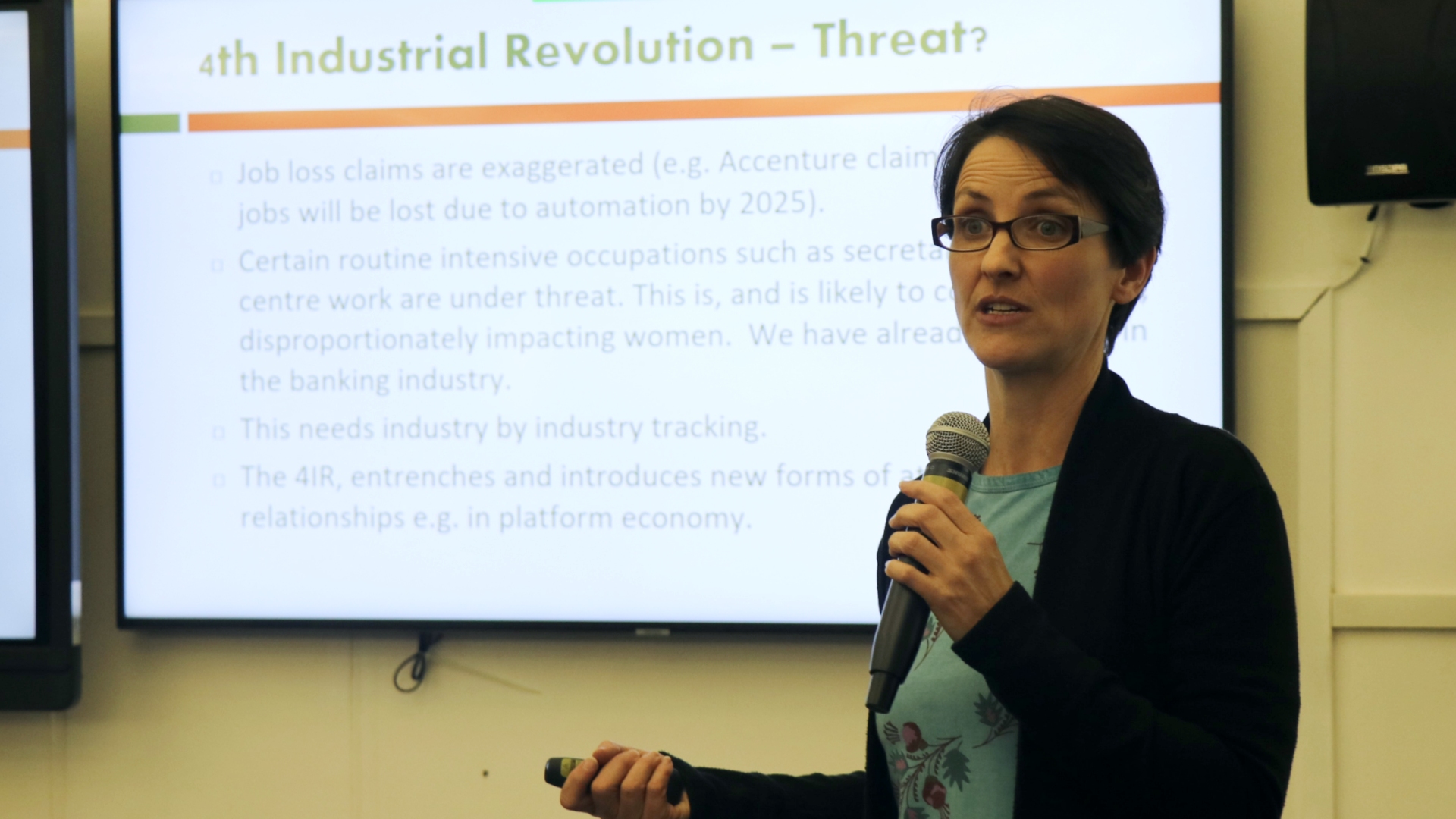Women predominate in many sectors of the informal economy; their lives, work, and struggles are often invisible to government and to the public at large.
Last week, PLAAS and the Faculty of Economic and Management Sciences (EMS) at the University of the Western Cape (UWC), hosted a public lecture and engagement event which gathered activists and academics to discuss these burning issues. The event was part of EMS dean, prof. Michelle Esau’s, Women’s Month event roster.
Esau opened the event by remarking that the informal economy and its sectors are vital to South Africa’s economy, but that it doesn’t get the support it needs.
“The informal sector is key in providing local communities with basic goods needed for everyday survival. Moreover, services such as childcare, caregivers and others, are key support services that enable so-called middle-class families to have peace of mind while they are at work. Yet, people working in these sectors are the most vulnerable and exploited. Regulatory framework hasn’t done enough to reduce the exploitation in these sectors; especially in terms of gender. An article published by the Mail and Guardian this year, highlighted the wage disparities between men and women in the informal sector; women earned less than men in the same broad categories of employment. And those women are in the lowest paying jobs in the informal sector.”
Esau also said that contrary to the view that digitisation enables, empowers, and facilitates access to information, research shows that the Fourth Industrial Revolution (4IR) and information and communications technology (ICT) in general, are increasing the gender-divide—women and girls have unequal digital experiences compared to their male counterparts.
Universities’ role in assisting those in the informal economy
During the event, PLAAS’s prof. Ruth Hall called the it “an effort to open a new conversation to identify and discuss struggles in informal sectors, and to create alliances and possibilities across the different sectors, and find what forms of support and solidarity the university can offer”.
Hall continued highlighting the necessity of the event, saying “we’re focussing on this during women’s month because we are such an unequal society; those inequalities are marked by race, but also by class and very much by gender.”
According to Hall, many women live lives of precarity, in work, employment, and self-employment. She said the role of a university is that of training and research, but also of supporting community processes and struggles.
“There are various ways in which universities can insert ourselves. We’re also keen on opening conversations to what kinds of topics and issues should be taken up by the university, and what post-graduate students should be working on in the future to respond to the world’s real demands. Events and efforts like these are what make UWC the place that it is: the home of the intellectual left. This event is to forge an agenda of what we should be doing from September to next-year August. And to make Women’s Month, an ongoing rolling commitment.”
Issues women in the informal economy face
The event’s public lecture, presented by Caroline Skinner of WIEGO and African Centre for Cities, covered ‘Women and Work in the Informal Economy’.
According to Skinner, 41,5% of women seeking employment from April to June 2019, couldn’t find work. She also said the labour market hasn’t changed much for women in the past decade; women still dominate domestic and clerical work.
She further said that a sector by sector approach of how the 4IR influences the displacement of women workers is needed.
“Women are being disadvantaged by the lack of internet access—cheap data and internet access are necessities for those working in the informal economy.”
Skinner also emphasised that the minimum wage isn’t always adhered to within the informal economy, and that many women have to feed entire households on a small pittance.
“Data shows that while there are a few people in the informal economy is doing well, they are in the minority. Women in the informal economy are working extremely long hours for small wages. The minimum wage is not being enforced, and many women are paid much less than regulation demands.”
Other issues that affect women in the informal economy, according to Skinner, is childcare and xenophobia. Skinner said studies show the lack of access to childcare is identified as the critical barrier to higher incomes and professional advancement for women. But she added that these and other issues can be conquered when women band together to face it.
“We cannot look at the informal economy without looking at migration; and this is a particular crisis in our country at the moment. In the face of state failure, immigrants are easy scapegoats—and the violent removal of foreigners, as seen in the inner-city of Johannesburg, is a violation of immigrants’ rights. While there are some ongoing litigation processes to protect foreigners and their rights to dignity and work, xenophobia still inflicts great damage to the economy.
“When looking to solve these issues workers are stronger collectively. Individually, they are very weak, but through collective organisation gains can be won. When women in the informal economy come together, they advance better in making sure policies and regulations work in their favour.”
- Listen to Caroline Skinner’s full lecture here.
- Listen to prof. Michelle Esau’s address here.
- Check out tweets from the event here.
This event was organised and convened by PLAAS’s profs. Ruth Hall and Moenieba Isaacs, for the Faculty of Economic and Management Sciences at the University of the Western Cape.

